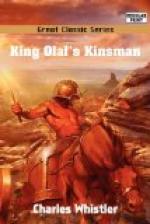Aye, they fought him. Wessex is covered with nameless battlefields; but ere long half of Cnut’s fleet was sent round to the Severn, and Ethelred, sick and despairing, came back to London with but a few men.
It angers me even to think of what befell after that. Eadmund and Streone gathered each a good force, and came together within touch of Cnut. And then on the eve of battle, Edric made known his plan to his Mercian thanes, and that was nothing more nor less than that they should go over bodily to Cnut when the fight began. Which treachery so wrought on the honest Mercians that they would fight not at all, and so disbanded in sight of the enemy, leaving Eadmund with but enough men to make good his retreat. And Cnut was master of all the land from Kent to Severn shores, Ethelred’s own country. So Edric Streone went over to Cnut, and with him many thanes who despaired of help from Ethelred, and chose rather peace under a king who was strong enough to give it them. And one night forty of the English ships slipped away from us down the tide and joined the Danes at Sandwich. The men had been bribed by Streone, as we found.
Almost then did Olaf make up his mind to leave England, but he pitied Ethelred, who turned to him again in this new trouble, and he did not go.
“But my men will not bide patiently much longer,” he told me; “here is neither honour nor gold to be won, and I need them for my going to Norway when the time comes.”
For every day Olaf looked for some sign that should bid him go back and take his own land from Cnut’s hand.
Now Ethelred would not stir from London, fearing treachery everywhere. And again Eadmund’s levies melted away for want of their king’s presence, and at last we persuaded him to meet Eadmund at Coventry, and I went with him. There was a good levy that would have followed him, but some breath of suspicion came over him, and suddenly he left them and fled back to London and the citizens, whom he trusted alone of all England. And he would not suffer me to bide with Eadmund, but I must go back with him. So the levies melted, and Eadmund went north to Earl Utred of Northumbria for help.
Then when the winter wore away, and April came in calm and bright, the most awesome thing befell England that had been yet. For in the north Eadmund and Utred marched across the country, laying waste all as they went, lest the north should rise for Cnut; and going east as they went west, Cnut ravaged and burnt all the southern midlands. Then rose the wail of all England, for friend and foe alike had turned on her, and her case was at its hardest. And from that time forwards I know that none who chose Cnut for king should be blamed.
Then Cnut fell on York, and Utred of Northumbria, whose wife was Danish, submitted to him, and was slain by Streone’s advice, as men say, though some say that he was slain by Thorkel the Jarl when he took the ships that tried to escape from the Humber. It may be thus. The shipmen fought well, and were all slain—sixty ships’ crews.




